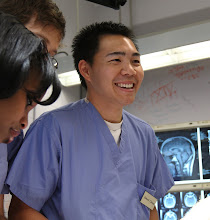Have you ever played the game when one person says a word, and the other person says the first word / thing that comes to mind? It’s often seen in movies when people are getting psychological tests done. Given that a lot of test taking is recognizing key words and answering questions based on what the right answer should be, it’d be really interesting to see how a medical student would score on one of those tests.
Thus far, we’ve studied cardiology and renal this year. I was thinking about how funny it would be to compare medical student “buzzword results” to those of “normal people.” Last week during small group, bread and butter came up, and the first thing that came to mind wasn’t breakfast or English tea, but pericarditis (because we’ve been told multiple times that pericarditis looks like bread and butter on the gross level).
As medical students and future physicians, we’re encouraged to sharpen our observational and deductive reasoning skills—after all, isn’t that how clinicians diagnose patients? What’s the most common cause of hypertension in a 76 year old man with high blood sugar? You put hypertension, an elderly man and high blood sugar together, and I spit out diabetes and nodular glomerulonephritis. As future clinicians, these buzzwords will rule our lives.
For me, I sometimes find myself so entrenched in medical school that I forget what it’s like to think about anything other than medicine. Since we recently studied renal, I’ve noticed that my thought pattern has changed. Usually when people feel the urge to urinate, they think of where the nearest bathroom is. Last week, I found myself tracing the nerve pathway of my detrusor muscle in my bladder back to my brain which was causing me to realize that I needed to pee. As I was relieving myself, it wasn’t the normal satisfaction that comes with peeing that was occupying my thoughts, but I found myself thinking about the pathway of urine from the glomerulus in my kidney all the way to the urinal cake in the bottom of the urinal.
Like most of my “problems” in medical school, I turned to my medical school friends to see if they had any similar experiences or if I truly should see a psychiatrist / psychologist to discuss my inability to separate medicine from every day life. The responses I got back varied from, “Whoa, you might want to chill out a little,” to “Oh my gosh, I last night I had a dream me rafting down a urine stream in a giant nephron last night!”
Reflecting on the variation of responses from various friends and family members, the same conclusion I get from everything else comes to the surface. Balance: it’s something everyone strives for, and few truly achieve. Many people in this world yearn for normalcy at one point or another in their lives. The truly successful are those who can achieve it at some extent.
This summer, during my cross-country bike trip, my good friend Jake gave me a piece of advice about balance. He said that the happiest people he knows who are established in whatever field that might be—law, medicine, business, art—have balanced lives. When he asked them about how they achieved balance in their lives, they said that they didn’t sacrifice the things that made them happy during their training. Prioritizing “balance” from the beginning will make it easier to maintain balance later on in life. This is the true test in medical school. Yes, our renal test was 41 pages, 3.5 hours and 120 questions long—a pretty serious test by anyone’s standards—but the true test, is achieving balance in the face of the behemoth of knowledge we’re required to learn.
My hope is that I can achieve this balance in life so that words like bread and butter bring to mind English breakfast tea and biscuits when I’m not studying instead of pericarditis.
-Ed Cheung
MD Class of 2012 Blog
Subscribe to:
Post Comments (Atom)


No comments:
Post a Comment